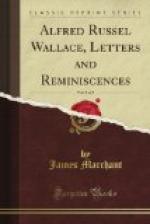Equally important is it to declare as a fixed principle that wages are to be and must be continuously raised, never lowered. You have too much arrears to make up—too many forces against you, to admit of their being ever lowered. Let future generations decide when that is necessary—if ever.
This is a principle worth enforcing by a general strike. Nothing less will be effective—nothing less should be accepted; and you must let the Government know it, and insist that they adopt it.
The rise must always be towards uniformity of payment for all useful and productive work.—Yours sincerely,
ALFRED E. WALLACE.
PART VI
Some Further Problems
I.—Astronomy
Of the varied subjects upon which Wallace wrote, none, perhaps, came with greater freshness to the general reader than his books written when he was nearly eighty upon the ancient science of astronomy.
Perhaps he would have said that the “directive Mind and Purpose” kept these subjects back until the closing years of his life in order that he might bring to bear upon them his wider knowledge of nature, enlightened by that spiritual perception which led him to link the heavens and the earth in one common bond of evolution, culminating in the development of moral and spiritual intelligences.
“Man’s Place in the Universe” (1903) was in effect a prelude to “The World of Life” (1910). Wallace saw afterwards that one grew out of the other, as we find him frequently saying with regard to his other books and essays.
As with Spiritualism, so with Astronomy, the seed-interest practically lay dormant in his mind for many years; with this difference, however, that temperament and training caused a speedy unfolding of his mind when once a scientific subject gripped him, whereas with Spiritualism he felt the need of moving slowly and cautiously before fully accepting the phenomena as verifiable facts.
It was during the later period of his land-surveying, when he was somewhere between the ages of 18 and 20, that he became distinctly interested in the stars. Being left much alone at this period, he began to vary his pursuits by studying a book on Nautical Astronomy, and constructing a rude telescope.[55] This primitive appliance increased his interest in other astronomical instruments, and especially in the grand onward march of astronomical discovery, which he looked upon as one of the wonders of the nineteenth century.
It was the inclusion of astronomy in lectures he delivered at Davos which led him to extend his original brief notes into the four chapters which form an important part of his “Wonderful Century.” He freely confessed that in order to write these chapters he was obliged to read widely, and to make much use of friends to whom astronomy was a more familiar study. And it was whilst he was engaged upon these chapters that his attention became riveted upon the unique position of our planet in relation to the solar system.




